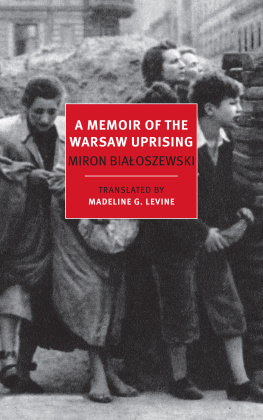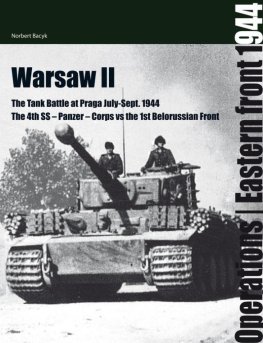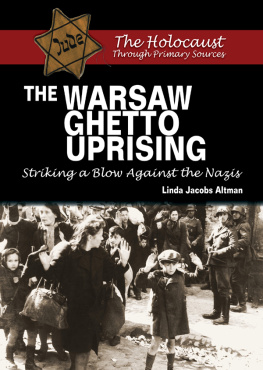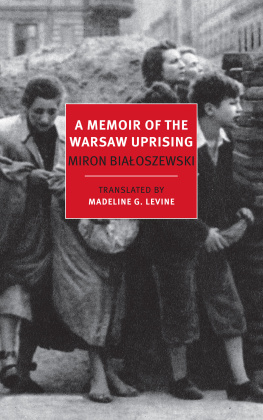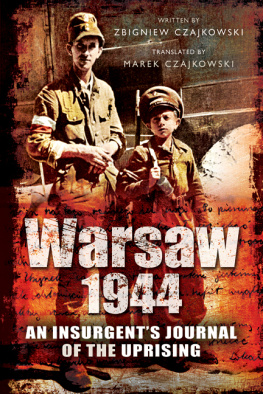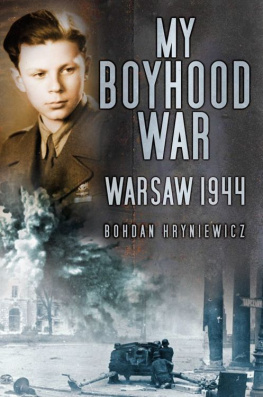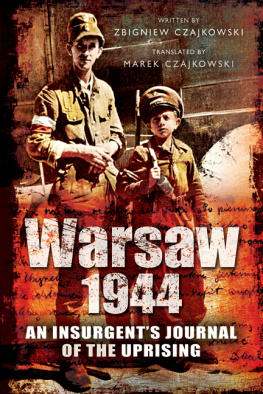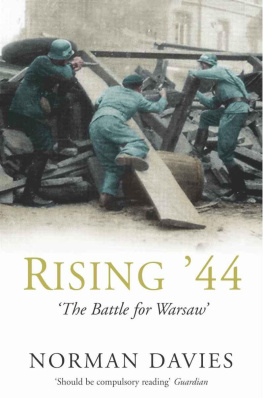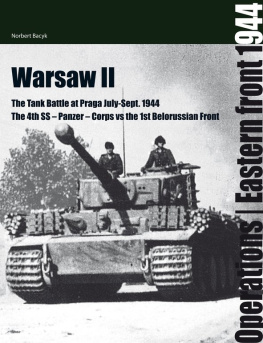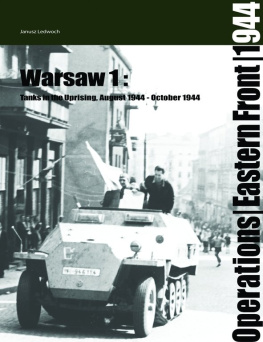MIRON BIAOSZEWSKI (19221983) was born in Warsaw, the son of a postal clerk. During the German occupation of Poland in World War II, he studied Polish literature in an underground school, though he never obtained any kind of degree. Not a combatant, he was deported to a German work camp following the Warsaw Uprising, escaped after a month and, as the war drew to its end, returned to his devastated city. Biaoszewski worked as a journalist, writing poetry at night, though it was not until 1956 that his first volume of poetry, Obroty rzeczy (The Revolution of Things), appeared to great acclaim. Additional volumes of poetry and short prose texts followed, while Biaoszewski also wrote plays for and acted with the collaborative and experimental Tarczyska Street Theater. A Memoir of the Warsaw Uprising came out in 1970.
MADELINE G. LEVINE is Kenan Professor of Slavic Literatures Emerita at the University of North Carolina, Chapel Hill. Her translations from the Polish include The Woman from Hamburg and Other True Stories by Hanna Krall, Bread for the Departed by Bogdan Wojdowski, four volumes of prose by Czesaw Miosz including Beginning with My Streets: Essays and Recollections and Mioszs ABCs, and a new English version of the collected stories of Bruno Schulz (forthcoming).
A MEMOIR OF THE WARSAW UPRISING
MIRON BIAOSZEWSKI
Translated from the Polish and with an introduction and notes by
MADELINE G. LEVINE
NEW YORK REVIEW BOOKS

New York
THIS IS A NEW YORK REVIEW BOOK
PUBLISHED BY THE NEW YORK REVIEW OF BOOKS
435 Hudson Street, New York, NY 10014
www.nyrb.com
Copyright 2014 by the Estate of Miron Biaoszewski, Warsaw
Original English translation 1977 by Ardis/The Overlook Press
Revised translation, introduction, and notes 2015 by Madeline G. Levine
All rights reserved.
A Memoir of the Warsaw Uprising was originally published in 1970 as Pamitnik z powstania warszawskiego by Pastwowy Instytut Wydawniczy, Warsaw. The revised edition, edited by Adam Poprawa, was published in 2014 as Volume 3 of the Collected Works of Miron Biaoszewski by Pastwowy Instytut Wydawniczy, Warsaw.
Publication of the 1977 translation was made possible in part by a grant from the University of North Carolina at Chapel Hill.
Cover photograph: Anonymous, Pedestrians Wait to Cross the Street, Warsaw, 1944
Cover design: Katy Homans
The Library of Congress has cataloged an earlier printing of this book as follows:
Library of Congress Cataloging-in-Publication Data
Bialoszewski, Miron, author.
[Pamietnik z Powstania Warszawskiego. English]
A memoir of the Warsaw uprising / by Miron Bialoszewski ; edited and translated by Madeline G. Levine.
p cm (New York review books classics)
Includes bibliographical references.
ISBN 978-1-59017-665-8 (alk. paper)
1. Warsaw (Poland)HistoryUprising, 1944Personal narratives. 2. Bialoszewski, Miron. 3. Authors, Polish20th centuryBiography. I. Title.
D765.2.W3B513 2013
943.8'41053092dc23
[B]
2013019758
ebook ISBN 978-1-59017-697-9
v 1.0
For a complete list of titles in the NYRB Classics series, visit www.nyrb.com or write to:
Catalog Requests, NYRB, 435 Hudson Street, New York, NY 10014
CONTENTS
TRANSLATORS INTRODUCTION
T HE RECEPTION of the original 1970 publication of Miron Biaoszewskis Pamitnik z powstania warszawskiego (A Memoir of the Warsaw Uprising) by readers and critics in Poland and the Polish diaspora was divided. Understood by many as a major literary event thanks to the authors bold rejection of unthinking nationalist fervor and powerful deployment of the norms of spoken language, the memoir was condemned by others as a blasphemous mockery of a revered moment in national history, the mockery made worse by the authors rejection of any hint of rhetorical pomposity. The functional prosaic title of the book appears to promise a work of unambiguous content: a recounting of a major historical eventthe Warsaw Uprising of 1944as recollected by a participant in that event. But Biaoszewskis memoir is not the straightforward narrative its simple title suggests.
If we can divide memoir literature into two basic categoriesone, the public figures review of events in the public domain, often written with an eye to perpetuating a particular interpretation of those events, and the other, the more private self-revelations of the memoirist who seeks in the past a clue to his own personality and careerwe can say that Biaoszewskis memoir partakes of qualities from each of these categories. His subject is a major historical event, but he was not a public figure when he participated in it. When he came to write his memoir some twenty years after the fact, his fame was as a private man of letters, yet his return to the past is not primarily a search for self-knowledge nor an effort to reveal to the public the sources of his art. Rather, A Memoir of the Warsaw Uprising is a nonfictional literary work that is deeply revisionist both in its presentation of the Warsaw Uprising and in its approach to the memoir genre.
The author of this controversial memoir was born in Warsaw in 1922 and made his home there until his death in 1983. Biaoszewski was seventeen years old when the Germans invaded Poland on September 1, 1939, and twenty-two during the Warsaw Uprising. He began to write during the German occupation. These bare biographical facts are shared by a generation of Polish writers who were born during the 1920s and who came to maturity during the Second World War. They grew up during Polands short-lived era of independence, which spanned the years between the Treaty of Versailles and the Nazi invasion. The spirit of national revival that marked the early years of the Polish Republic faltered under the anxious uncertainty of the 1930s and collapsed during the more than five years of occupation.
The crucial experience in the lives of the generation to which Biaoszewski belongs was the traumatic loss of a normal youth during a period when violent death was an ever-present possibility. Old enough to have absorbed the traditional Polish Catholic patriotism, members of this generation emerged from the war distrusting the tradition-sanctioned slogans and philosophies they had been raised on, substituting for positive beliefs an attitude of moral relativism. The grim experiences of their young adulthood left an indelible mark on the literary output of this generation, which includes, among other writers familiar to readers of their works in English translation, such giants of twentieth-century Polish letters as Tadeusz Rewicz and Tadeusz Borowski. Biaoszewski bears a family resemblance to these authors in that, like them, he is obsessed with the fragility of civilization and displays little if any faith in the durability of cultural and moral codes. Like them, he expresses his disaffection by rejecting the traditional standards of aesthetics in order to seek a more appropriate style for his fundamental skepticism.
Throughout Biaoszewskis poetry and prose (the boundaries between these two categories are often blurred) there is a consistent thematic concentration on simple objects and personal events that are outside the mainstream of traditional poetic subject matter.[] His poems in praise of such domestic articles as slotted spoons, stoves, chairs, and quilts are typical of this attitude. His poetic iconoclasm, manifested by a disdain for conventional language as well as subject matter, aroused highly partisan feelings among Polish critics and, on more than one occasion, the censors insistence on adherence to grammatical correctness.

